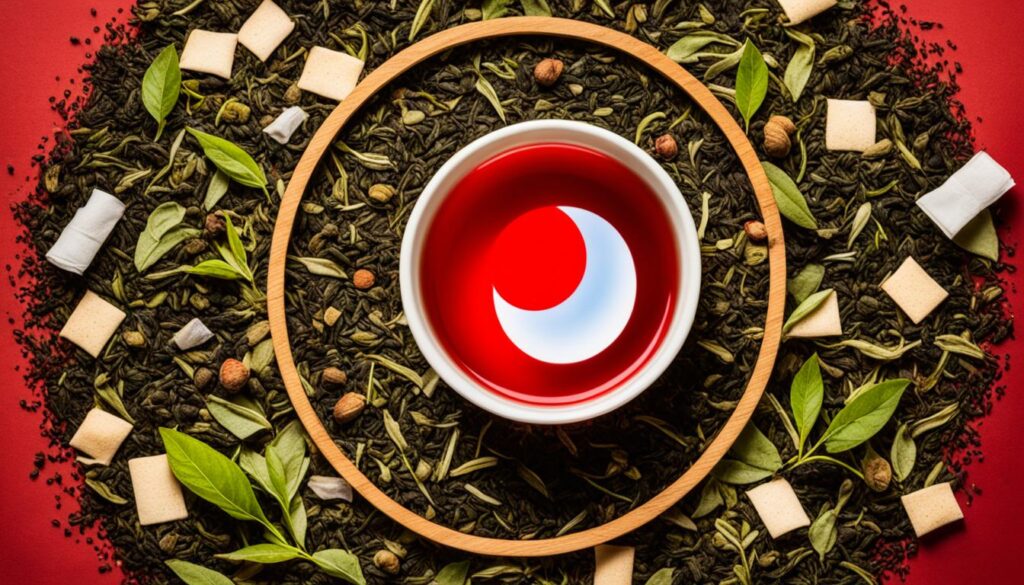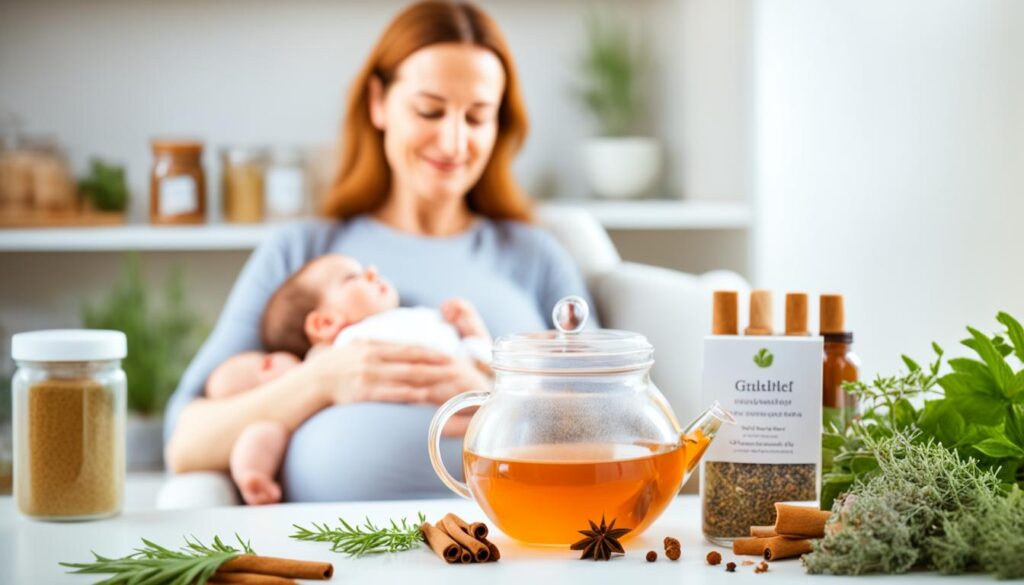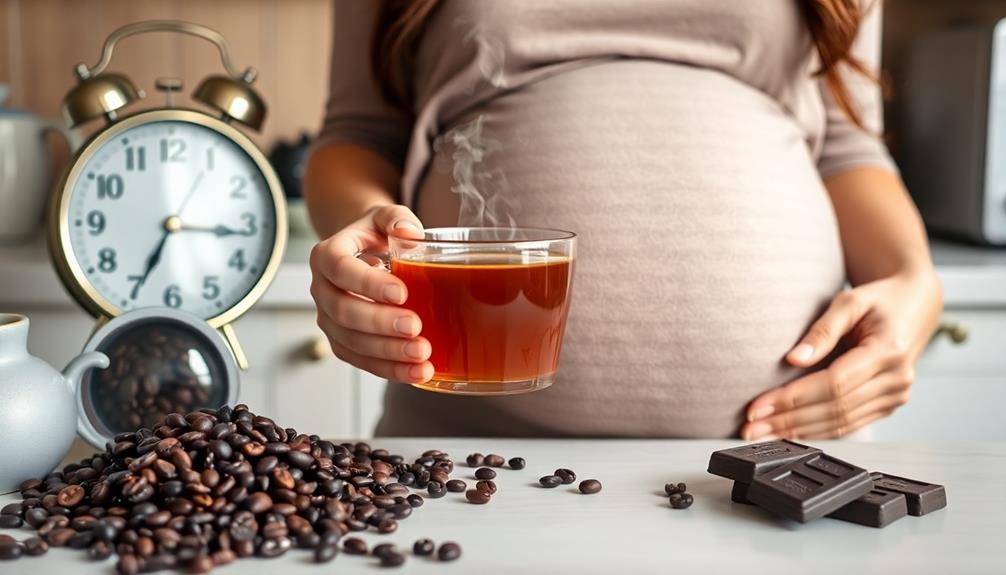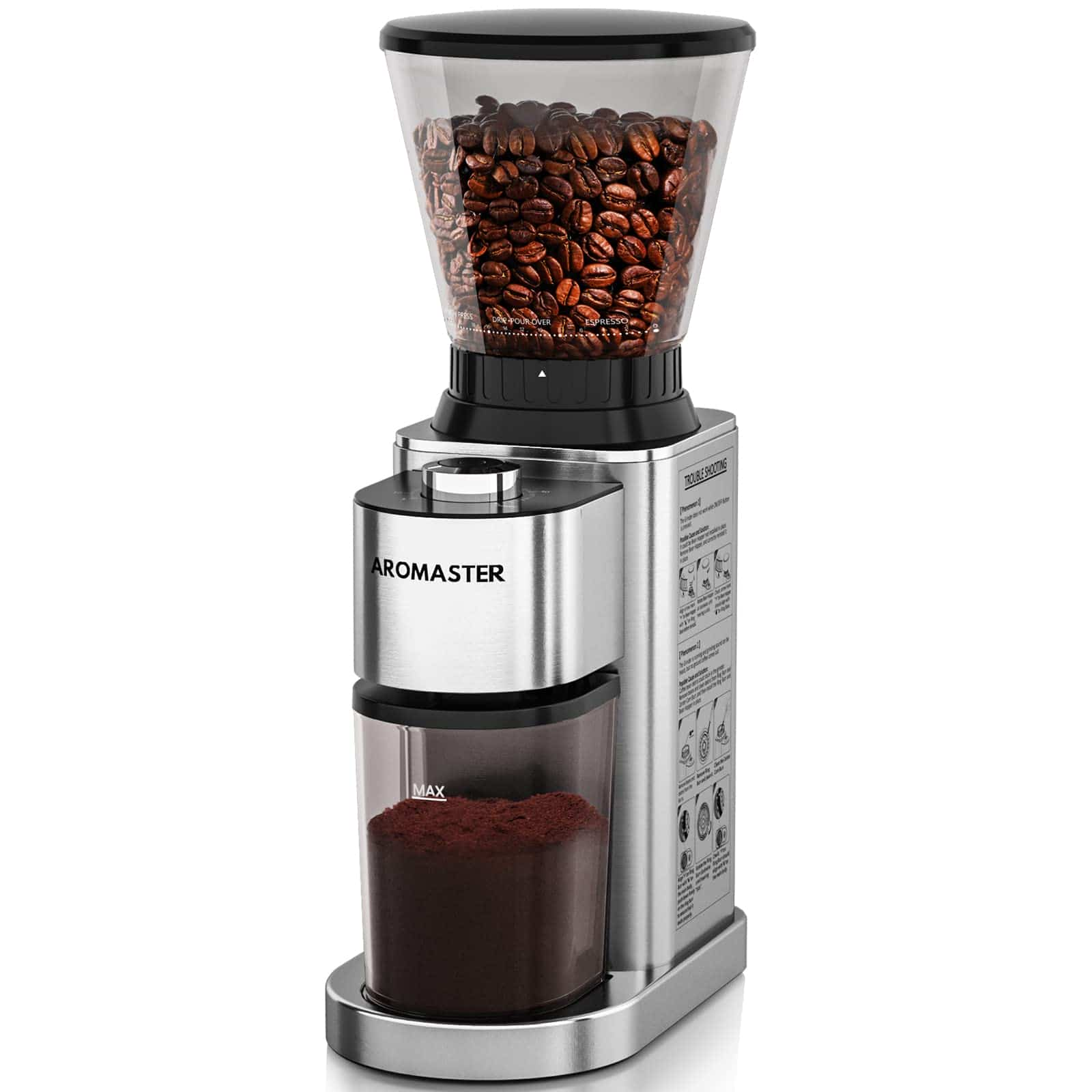Coffee, Tea and Alternatives and Health plus Fitness
Cinnamon Tea for Breastfeeding Moms: Safety Guide

Did you know that cinnamon is not only a popular spice but also has potential health benefits for breastfeeding moms? If you are wondering whether you can safely drink cinnamon tea while breastfeeding, you’ve come to the right place. In this article, we will explore the safety considerations of consuming cinnamon tea during lactation and provide you with valuable insights to make informed choices for you and your little one.
Key Takeaways:
- Consuming cinnamon in moderation is generally safe during pregnancy and lactation.
- Excessive consumption of cinnamon may cause adverse side effects, so it’s important to exercise moderation.
- No official guidelines exist for the safe daily dosage of cinnamon, so it’s best to consult a healthcare provider.
- Cinnamon supplements should be avoided during pregnancy and breastfeeding.
- Cinnamon tea does not induce labor, but excessive consumption can have side effects.
Is it Safe to Drink Herbal Teas While Breastfeeding?
While most people believe that herbal tea helps purify the blood and increase the production of breast milk, medical research is yet to prove the exact health benefits it offers. It is better to avoid drinking herbal tea while breastfeeding. If you do wish to have some, make sure to speak to a licensed herbal practitioner, a lactation consultant, or your medical practitioner.
Herbal Teas That May Increase Breast Milk Production
Some herbal teas may increase breast milk production, such as fenugreek tea, fennel tea, and blessed thistle tea. However, peppermint tea and other herbs like parsley and sage may decrease milk supply. It is important to consult a doctor before consuming any herbal tea while breastfeeding.
Let’s take a closer look at the herbal teas that may increase breast milk production:
| Herbal Tea | Effect on Milk Supply |
|---|---|
| Fenugreek Tea | May increase milk supply |
| Fennel Tea | May increase milk supply |
| Blessed Thistle Tea | May increase milk supply |
Herbal Teas That May Decrease Breast Milk Production
Peppermint tea and other herbs like parsley and sage may decrease milk supply. It is important to consult a doctor before consuming any herbal tea while breastfeeding.
Here are some herbal teas that may decrease breast milk production:
| Herbal Tea | Effect on Milk Supply |
|---|---|
| Peppermint Tea | May decrease milk supply |
| Parsley Tea | May decrease milk supply |
| Sage Tea | May decrease milk supply |
It is important to choose your herbal teas carefully while breastfeeding to ensure the health and safety of both you and your baby.
Herbal Teas That May Increase Breast Milk Production
When it comes to increasing breast milk production, many breastfeeding moms turn to herbal teas for their potential benefits. While the scientific evidence may be limited, certain herbal teas have been believed to have galactagogue properties, which may help stimulate lactation and boost milk supply. Here are some herbal teas that are often recommended to increase breast milk production:
- Fenugreek Tea: Fenugreek seeds have long been used in traditional medicine as a remedy for low milk supply. Fenugreek tea is thought to contain compounds that can mimic estrogen, which may help stimulate milk production.
- Fennel Tea: Fennel seeds are known for their potential to enhance lactation. Fennel tea is believed to stimulate milk production and ease digestion for both mother and baby.
- Blessed Thistle Tea: Blessed thistle is a flowering plant that has been used for centuries to promote lactation. Blessed thistle tea is thought to have properties that can increase milk supply and improve milk flow.
- Alfalfa Tea: Alfalfa is a nutrient-rich herb that is often used to boost overall health. It is believed that alfalfa tea may also have a positive effect on milk production due to its high content of vitamins and minerals.
- Raspberry Leaf Tea: Raspberry leaf tea is commonly recommended for its potential benefits during pregnancy and postpartum. It is believed to help tone the uterus and support milk production.
- Goat’s Rue Tea: Goat’s rue has been historically used to enhance milk production in livestock. Goat’s rue tea is thought to have similar effects in humans, potentially increasing lactation and milk supply.
- Stinging Nettle Tea: Stinging nettle is a herb that is rich in vitamins and minerals. It is believed that stinging nettle tea may help increase milk production and provide additional nutritional benefits for both mother and baby.
- Milk Thistle Tea: Milk thistle is a well-known herb that is often used for liver health. Some breastfeeding mothers have reported an increase in milk supply after consuming milk thistle tea.
Please note that while these herbal teas have been traditionally used to enhance lactation, their efficacy and safety in breastfeeding moms have not been extensively studied. It is always advisable to consult with a healthcare provider before incorporating any herbal teas into your breastfeeding journey.
| Herbal Tea | Potential Benefits |
|---|---|
| Fenugreek Tea | May stimulate milk production |
| Fennel Tea | May enhance lactation and improve digestion |
| Blessed Thistle Tea | May increase milk supply and improve milk flow |
| Alfalfa Tea | May boost overall health and potentially increase milk production |
| Raspberry Leaf Tea | May help tone the uterus and support milk production |
| Goat’s Rue Tea | Potentially enhances milk production and lactation |
| Stinging Nettle Tea | May increase milk production and provide nutritional benefits |
| Milk Thistle Tea | Reported increase in milk supply |
Remember, each individual’s response to herbal teas may vary. It is important to monitor your milk supply and seek guidance from a healthcare professional if you have any concerns or questions about increasing your breast milk production.
Herbal Teas That May Decrease Breast Milk Production
When it comes to herbal teas and breastfeeding, certain teas may have an impact on your milk supply. In particular, peppermint tea and oregano tea are believed to have properties that can decrease breast milk production. If you are a breastfeeding mother looking to maintain or increase your milk supply, it is advisable to avoid these teas.
Peppermint tea is known for its refreshing flavor and soothing effects on the digestive system. However, it is believed to contain compounds that can inhibit the production of breast milk. Oregano tea, on the other hand, has traditionally been used to alleviate menstrual pain and stimulate menstruation. Some researchers suggest that oregano tea’s ability to influence menstruation may also have an effect on lactation by reducing milk supply.
If you are unsure whether a particular herbal tea may decrease your breast milk production, it is always best to consult with a healthcare professional or a lactation consultant. They can provide personalized advice and guidance based on your specific situation. They can also suggest alternative herbal teas that are safe to consume while breastfeeding and may even help promote lactation.

While herbal teas can offer various health benefits, it is crucial to be mindful of their potential effects on milk supply. If you notice a decrease in your milk production after consuming a specific herbal tea, consider eliminating it from your diet and monitoring the impact on your lactation. Additionally, maintain a well-balanced diet, stay adequately hydrated, and engage in frequent breastfeeding or pumping sessions to support healthy milk production.
Herbal Teas That May Harm the Baby and Mother
Certain herbal teas can have harmful effects on both the baby and the mother during lactation. It is crucial to avoid these teas to protect the health of both individuals. The following herbal teas should be avoided while breastfeeding:
- Ginseng Tea
- Star Anise Tea
- Rhubarb Root Tea
- Aloe Tea
- Valerian Root Tea
- Licorice Root Tea
These teas have been associated with potential risks to the baby’s health and may also impact milk production. It is essential to exercise caution and avoid consuming these teas while breastfeeding to ensure the well-being of both the baby and the mother.

Why should you avoid these herbal teas?
These herbal teas have been found to have certain properties or compounds that could be potentially harmful during breastfeeding. It’s important to understand the potential risks associated with each tea.
Ginseng tea, for example, has been linked to adverse effects on lactation and may decrease milk production. Star anise tea contains a compound called anethole, which can mimic estrogen in the body and may have negative effects on both the mother and the baby. Rhubarb root tea can have laxative effects and may cause diarrhea or stomach discomfort in infants.
Aloe tea, valerian root tea, and licorice root tea have also been associated with potential risks during breastfeeding. Aloe tea can have a laxative effect and may lead to diarrhea in the baby. Valerian root tea may cause drowsiness and sedation in infants. Licorice root tea contains a compound called glycyrrhizin, which can lead to high blood pressure and electrolyte imbalances, especially when consumed in large quantities.
It is important to remember that while these teas may have health benefits for some individuals, they can pose risks to breastfeeding mothers and their babies. Therefore, it is best to avoid these herbal teas during lactation and consult with a healthcare professional for guidance on safe alternatives.
Teas to Avoid While Breastfeeding
As breastfeeding moms, we need to be cautious about the teas we consume, as certain varieties may have adverse effects on our health and the health of our little ones. It is essential to prioritize our baby’s well-being and take necessary precautions when it comes to choosing the right teas.
One commonly consumed herbal tea, chamomile tea, should be approached with moderation and after consulting with a healthcare provider. While chamomile tea is generally considered safe, excessive consumption may lead to potential risks due to certain compounds present in the tea.
Caffeine is another component to watch out for in teas. Excessive caffeine intake can be harmful to the baby, affecting their sleep patterns and leading to irritability. Therefore, it is important to check if the tea contains caffeine before consuming.
Furthermore, herbal teas have the potential to interact with medications or other supplements commonly used during breastfeeding. These interactions can affect the efficacy and safety of both the herbal teas and the medications. It is advisable to seek medical advice before consuming any tea while breastfeeding to ensure there are no harmful interactions.
To summarize, here are the teas to avoid while breastfeeding:
| Tea | Reason to Avoid |
|---|---|
| Chamomile Tea | Potential risks associated with certain compounds |
| Caffeinated Teas | Excessive caffeine intake can be harmful to the baby |
| Teas with Medication Interactions | Herbal teas may interact with medications or other supplements commonly used during breastfeeding, affecting efficacy and safety |
Remember, it is always better to err on the side of caution when it comes to consuming teas while breastfeeding. Prioritize your baby’s health and seek guidance from healthcare professionals to make informed choices.

Herbal Teas for Common Breastfeeding Issues
When it comes to breastfeeding, many women may encounter common issues such as engorgement or mastitis. Fortunately, there are herbal teas that can offer relief and support in managing these challenges. One such tea is sage tea, which has been known to help women with breast engorgement due to hypergalactia.
However, before incorporating sage tea or any other herbal tea into your diet while breastfeeding, it is essential to consult with your doctor. Despite the potential benefits, the safety and efficacy of herbal teas for breastfeeding women are not well-established.
| Herbal Tea | Potential Benefits |
|---|---|
| Sage Tea | May help relieve breast engorgement due to hypergalactia |
It’s important to remember that each breastfeeding journey is unique, and what works for one person may not work for another. A healthcare professional can provide personalized guidance based on your specific needs and circumstances.
It’s always advisable to exercise caution and prioritize your safety and the well-being of your baby. If you’re experiencing any breastfeeding issues, consult with a healthcare provider to determine the most appropriate course of action.
Interactions of Herbal Teas with Medications and Supplements While Breastfeeding
When it comes to consuming herbal teas while breastfeeding, it’s essential to be aware of potential interactions with medications and supplements commonly used during this time. Some herbs contain medicinal compounds that can interact with certain medications, posing a safety risk. While the knowledge of specific herb-drug interactions is limited, it’s always best to consult with a healthcare provider before incorporating herbal teas into your breastfeeding routine.
Interactions between Herbal Teas and Medications
Herbal teas can contain active ingredients that may affect the way medications work in the body. Certain herbs have the potential to enhance or inhibit the effects of medications, leading to unpredictable results. It’s important to discuss any herbal tea consumption with your healthcare provider to ensure it doesn’t interfere with the efficacy or safety of your prescribed medications.
Interactions between Herbal Teas and Supplements
In addition to medications, herbal teas may also interact with other dietary supplements commonly used by breastfeeding women. Some supplements might have overlapping effects or interactions with specific herbs, impacting their effectiveness or even causing potential harm. It’s crucial to inform your healthcare provider about any herbal tea or supplement usage to ensure their compatibility and avoid any potential risks.
Remember, while herbal teas are often considered natural, they still have the potential to interact with other substances. Each person’s unique physiology and medication regimen can influence how these interactions occur. Therefore, seeking professional guidance before combining herbal teas with medications or supplements is vital for your safety and the well-being of your baby.

| Interaction | Potential Effects |
|---|---|
| Herbal Tea + Medication | Possible alteration of medication efficacy or side effects |
| Herbal Tea + Dietary Supplement | Possible reduction in supplement effectiveness or adverse reactions |
| No Interaction | Safe combination of herbal tea with medications or supplements |
Tips for Consuming Herbal Teas While Breastfeeding
If you choose to consume herbal teas while breastfeeding, it is important to follow certain safety tips to ensure the well-being of both you and your baby. Here are some helpful guidelines to keep in mind:
- Consult your doctor: Before trying any herbal tea, it is always wise to speak with your healthcare provider. They can provide personalized advice based on your specific needs and medical history.
- Opt for caffeine-free: When selecting an herbal tea, make sure it is caffeine-free. Too much caffeine can have negative effects on your baby’s health. So, it’s best to choose caffeine-free options to enjoy a safe and soothing experience.
- Check for allergens: Read the ingredients of the herbal tea to check for any potential allergens. Some herbal teas may contain ingredients that could trigger allergies or sensitivities in you or your baby. Being aware of the ingredients can help you make an informed decision while choosing a suitable herbal tea.
- Practice moderation: As with any food or beverage, it is important to consume herbal teas in moderation. While herbal teas can have several benefits, excessive consumption may not always be advisable. Enjoying them in moderate amounts will help you maintain a balanced and healthy approach.
- Avoid frequent switching: It is recommended to limit switching between different herbal teas while breastfeeding. This will minimize exposure to various substances and reduce the risk of potential complications. Stick to one herbal tea that suits you well and enjoy it mindfully.
By following these tips, you can savor the goodness of herbal teas while ensuring the safety and well-being of both you and your baby.

Spices and Breastfeeding
While breastfeeding, it’s important to consider the potential effects of spices on both the mother and the baby. Most spices are generally safe to consume in moderation, but some may have adverse effects if consumed excessively. Here’s what you should know about consuming spices while breastfeeding:
Safe Spices for Breastfeeding
Spices like cumin, cardamom, turmeric, and ginger are typically considered safe to consume in moderation while breastfeeding. These spices can add flavor to your meals and provide potential health benefits without causing harm to you or your baby.
Spices to Be Cautious About
While spices like nutmeg and cinnamon are commonly used, excessive consumption may not be recommended during lactation. These spices have been associated with potential adverse effects in both lactating mothers and breastfed infants. It’s best to consult your healthcare provider for personalized guidance on consuming these spices.
Excessive consumption of spices like nutmeg and cinnamon during breastfeeding may not be recommended, as they may cause adverse effects in lactating mothers or breastfed infants.
Consult Your Healthcare Provider
When it comes to consuming spices during breastfeeding, it’s always a good idea to consult your healthcare provider. They can provide you with personalized guidance based on your health, medical history, and individual circumstances.
Summary
In summary, while many spices are generally safe to consume during breastfeeding, it’s important to be mindful of the potential effects they may have on both you and your baby. Safe spices like cumin, cardamom, turmeric, and ginger can add flavor and potential health benefits to your diet while breastfeeding. However, excessive consumption of spices like nutmeg and cinnamon may not be recommended. Prioritize moderation and consult your healthcare provider for personalized guidance on consuming spices during lactation.
Safety Precautions for Consuming Spices While Breastfeeding
When it comes to consuming spices while breastfeeding, it’s crucial to prioritize safety precautions for the well-being of both the mother and the baby. While spices can add flavor and variety to your meals, it’s essential to be aware of potential risks and take necessary steps to avoid any adverse effects.
One of the primary considerations is the possibility of allergic reactions to certain spices. Some individuals may have sensitivities or allergies to specific spices, which can result in itching, rashes, or difficulty breathing. It’s vital to pay attention to your body’s reactions and discontinue the use of any spice that causes an allergic response.
Another aspect to consider is the potential for heartburn or indigestion when consuming excessive amounts of spices. Certain spices can have a stimulating effect on the digestive system, leading to discomfort or gastrointestinal issues. It’s advisable to consume spices in moderation and listen to your body’s signals to prevent any discomfort.
Furthermore, if you are taking blood-thinning medication, it’s important to be cautious with certain spices, particularly cinnamon. Cinnamon has been found to lower platelet count, which can interfere with the effectiveness of blood-thinning medications. It’s best to avoid consuming excessive amounts of cinnamon or any other spices if you are on such medication. Consult with your healthcare provider to ensure the safe consumption of spices while considering your specific circumstances.
In summary, it’s crucial to exercise caution and follow safety precautions when consuming spices during breastfeeding. Be mindful of potential allergic reactions, avoid excessive consumption to prevent heartburn or indigestion, and be aware of spice-specific considerations, such as the impact of cinnamon on platelet count. By consuming spices in moderation and being attentive to any potential side effects, you can enjoy the flavors they bring while maintaining the well-being of both you and your baby.
Conclusion
In conclusion, breastfeeding moms can safely enjoy cinnamon tea in moderation as part of their lactation journey. It is crucial to exercise caution and avoid excessive consumption of cinnamon tea or any other herbal teas. While some herbal teas may help increase breast milk production, others may have the opposite effect.
Before incorporating herbal teas into your breastfeeding routine, it is advisable to consult a healthcare provider. They can provide personalized guidance based on your specific needs and ensure the safety of both you and your baby. Remember that moderation is key when it comes to consuming herbal teas during lactation.
Additionally, it is important to be mindful of the potential effects of spices on both you and your baby. While spices like cumin, cardamom, turmeric, and ginger are generally considered safe in moderation, it is best to consult your healthcare provider for individualized advice. They can provide you with the necessary information to make informed decisions about consuming spices while breastfeeding.
Overall, practicing moderation and maintaining open communication with your healthcare provider will help you navigate the world of herbal teas and spices during lactation, ensuring the well-being of both you and your little one.
Consuming cinnamon tea in moderation is generally considered safe during breastfeeding. However, excessive consumption of cinnamon tea should be avoided as it may have adverse side effects.
It is generally advised to be cautious with herbal tea consumption while breastfeeding. While some herbal teas may help increase breast milk production, others may decrease it or have harmful effects. It is recommended to consult with a healthcare provider before consuming any herbal tea while breastfeeding.
Some herbal teas believed to have galactagogue properties and may aid in increasing milk supply include fenugreek tea, fennel tea, blessed thistle tea, alfalfa tea, raspberry leaf tea, goat’s rue tea, stinging nettle tea, and milk thistle tea. However, scientific evidence on their efficacy and safety is limited.
Yes, herbal teas such as peppermint tea and oregano tea may have properties that can reduce breast milk supply. It is advisable to avoid these teas if you are breastfeeding and want to maintain or increase your milk production. Certain herbal teas, including ginseng tea, star anise tea, rhubarb root tea, aloe tea, valerian root tea, and licorice root tea, should be avoided while breastfeeding as they may pose risks to the baby’s health and affect milk production.
Yes, some teas, like chamomile tea, should be consumed in moderation and after consulting with a healthcare provider. It is also important to check if the tea contains caffeine as excessive caffeine intake can be harmful to the baby. Additionally, herbal teas may interact with medications or other supplements commonly used during breastfeeding, so it is advisable to seek medical advice before consuming any tea.
Some herbal teas, such as sage tea, are known to help women with breast engorgement due to hypergalactia. However, the safety and efficacy of herbal teas for breastfeeding issues are not well-established, so it is important to consult a doctor before incorporating them into your diet.
Some herbal teas may have interactions with medications or other supplements commonly used during breastfeeding. It is advisable to consult a healthcare provider before consuming herbal teas or medications to ensure their compatibility and safety.
If you choose to consume herbal teas while breastfeeding, it is important to speak to your doctor before trying any herbal tea. Check that the tea is caffeine-free and free from potential allergens. It is also recommended to limit switching between different herbal teas to minimize exposure to various substances. While many spices are generally safe to consume during breastfeeding, it is important to be mindful of their potential effects on both the mother and the baby. It is recommended to consult a healthcare provider for personalized guidance on consuming spices during breastfeeding.
It is important to exercise safety precautions when consuming spices while breastfeeding. Some individuals may have allergic reactions to certain spices, and consuming excessive amounts may induce heartburn or indigestion. Additionally, spices like cinnamon can lower platelet count, so it should be avoided if taking blood-thinning medication.
FAQ
Is it safe to drink cinnamon tea while breastfeeding?
Can herbal teas be consumed while breastfeeding?
Which herbal teas can help increase breast milk production?
Are there any herbal teas that may decrease breast milk production?
Which herbal teas should be avoided while breastfeeding?
Are there any teas that should be avoided while breastfeeding?
Can herbal teas help with common breastfeeding issues?
Do herbal teas interact with medications and supplements while breastfeeding?
What are some safety tips for consuming herbal teas while breastfeeding?
Are spices safe to consume while breastfeeding?
What safety precautions should be taken when consuming spices while breastfeeding?
Source Links
- https://www.babycenter.com/baby/breastfeeding/breast-milk-interactions-chart_8788
- https://www.momjunction.com/articles/herbal-tea-while-breastfeeding_00359185/
- https://www.healthline.com/health/pregnancy/cinnamon-pregnancy
Noah, the Editor-in-Chief at Cappuccino Oracle, plays a pivotal role in shaping the voice and vision of our renowned platform. With an unwavering passion for coffee, coffee alternatives, and tea, Noah leads Cappuccino Oracle towards new horizons in the realm of coffee journalism.
Beyond his professional responsibilities, Noah serves as a mentor and guiding force for his team. His dedication to journalistic excellence and genuine love for coffee, coffee alternatives, and tea continue to inspire and motivate the Cappuccino Oracle family. In the ever-evolving world of these beverages, Noah’s leadership ensures that our platform remains at the forefront, delivering enlightening and enjoyable content to our readers worldwide.
Coffee, Tea and Alternatives and Health plus Fitness
Male Fertility and Coffee Consumption
Keen to understand how your coffee habits influence male fertility? Discover the surprising effects of caffeine on sperm quality and reproductive health.

Your coffee consumption can directly impact your male fertility. Studies show that moderate intake, about 1-2 cups a day, is generally safe and might even improve sperm motility. However, exceeding this amount can lower IVF success rates and negatively affect sperm quality, including motility and count. Excessive caffeine, particularly from sugary sodas, may disrupt hormonal levels and lead to reproductive health issues. To support your fertility, aim for a moderate caffeine intake of 2-3 cups daily. There's more to explore about the connections between lifestyle choices and fertility health that could be beneficial for you.
Key Takeaways
- Moderate coffee consumption (1-2 cups/day) is safe and may even improve sperm motility, supporting male fertility.
- Excessive coffee intake (2+ cups/day) is linked to decreased IVF success rates and impaired sperm quality.
- High caffeine intake can disrupt hormonal balance, potentially lowering testosterone and increasing estrogen levels in men.
- Sugar-laden beverages, especially cola, negatively impact sperm health and can trigger hormonal imbalances affecting fertility.
- Health professionals recommend limiting caffeine to 2-3 cups daily to support reproductive health and fertility.
Overview of Male Fertility

Understanding male fertility is essential for those looking to conceive. Approximately 7% of men globally face male infertility, which often stems from low sperm count, poor sperm motility, and abnormal sperm morphology.
If you're trying to conceive, it's vital to recognize how your lifestyle choices impact your reproductive health.
Diet plays a significant role; research shows that non-cola drinkers have an average sperm concentration of 56 million/mL, while high cola drinkers average only 40 million/mL. This suggests that what you consume can directly affect your sperm health.
Exercise is equally important, as maintaining a healthy weight can improve your overall fertility outcomes.
Moreover, environmental factors and exposure to toxins can further exacerbate the risk of male infertility. Unhealthy habits, such as smoking or excessive alcohol consumption, can also diminish your chances of conceiving.
Taking a holistic approach to your reproductive health means addressing these lifestyle choices and making positive changes. By understanding these aspects of male fertility, you can take proactive steps toward enhancing your chances of conception and addressing any potential male infertility issues.
Coffee Consumption and Caffeine

When it comes to coffee and fertility, caffeine plays an essential role that you need to take into account.
Excessive intake, especially beyond two cups a day, can lower your chances of successful IVF and may negatively affect sperm quality.
On the other hand, moderate consumption mightn't have a significant impact, so finding the right balance is key.
Caffeine's Impact on Fertility
Frequent coffee consumption can play a significant role in male fertility, with research showing varying effects based on the amount consumed. High caffeine intake, particularly from caffeinated sodas and energy drinks, can negatively impact sperm quality, leading to decreased motility and volume.
If you consume more than two cups of coffee daily, you might find that your chances of successful IVF pregnancies drop below 20%. On the other hand, those who limit their intake to less than one cup daily enjoy over a 50% success rate.
Interestingly, some studies suggest that moderate coffee consumption—about one to two cups per day—may not adversely affect male fertility. In fact, a Brazilian study found a correlation between higher coffee consumption and improved sperm motility, indicating potential benefits from moderate intake.
However, be cautious of the sugar content in caffeinated beverages like cola, as excess sugar has been linked to decreased sperm count and function.
Ultimately, while caffeine affects male fertility, the key lies in finding a balance that works for you. Moderation appears to be the safest approach when it comes to coffee and fertility.
Recommended Coffee Intake Levels
To promote ideal male fertility, it's essential to be mindful of your coffee intake. Research suggests that moderate coffee consumption—typically defined as 1-2 cups daily—can be safe for maintaining reproductive health. Each cup of coffee contains about 96 mg of caffeine, placing your caffeine intake well within the recommended coffee intake levels when you stick to this guideline.
Studies show that a low (101-200 mg) to moderate (201-800 mg) caffeine intake doesn't negatively affect semen quality. This means you can enjoy your daily cups without worrying too much about impairing your fertility.
However, if you consume more than 2 cups a day, you might face potential risks. Excessive coffee consumption has been linked to lower success rates in assisted reproductive technologies like IVF, as well as impaired sperm quality and motility.
Health professionals generally recommend limiting your caffeine intake to 2-3 cups per day to avoid any negative impacts on your reproductive health. By keeping your consumption within these recommended levels, you'll be taking a proactive step toward supporting your fertility.
Study Findings on Semen Quality

When it comes to caffeine's impact on sperm quality, research shows mixed results.
While moderate coffee consumption seems safe, high cola intake might negatively affect sperm concentration.
It's important to evaluate consumption guidelines and the limitations of available studies as you assess your own habits.
Caffeine's Impact on Sperm
Numerous studies have explored caffeine's impact on sperm health, revealing a complex relationship between consumption levels and semen quality. For instance, a significant study of 2,554 young Danish men found that high cola consumption—more than 14 half-liter bottles a week—led to reduced sperm concentration and total sperm count. This suggests that cola's unique ingredients might negatively affect sperm independent of caffeine intake.
When it comes to moderate caffeine intake, researchers observed no significant effects on semen quality. Low intake, defined as less than 100 mg per day, also showed no correlation with reduced sperm parameters. Notably, non-cola drinkers had higher sperm concentrations compared to those who consumed high amounts of cola, emphasizing the potential risks associated with cola drinks.
However, some studies indicated that excessive coffee consumption could lower IVF success rates. Men drinking two or more cups daily had less than a 20% chance of pregnancy, while those consuming under one cup daily boasted over a 50% success rate.
Coffee Consumption Guidelines
Excessive coffee consumption can greatly impact male fertility, particularly for those undergoing IVF treatments. Studies show that drinking two or more cups daily may reduce your chances of pregnancy to less than 20%, compared to over 50% for those who consume less than one cup daily.
To adhere to effective coffee consumption guidelines for fertility, aim for moderate intake of about 1-2 cups daily. This amount, which translates to roughly 96 mg of caffeine per cup, is generally considered safe and unlikely to harm semen quality.
However, it's essential to remain cautious about high caffeine intake, as some research indicates it could lead to decreased sperm quality and motility. This suggests that there's a potential threshold effect, where moderation becomes critical for maintaining reproductive health.
Additionally, consider the sugar in caffeinated soft drinks, which may further complicate the effects on sperm health. Ultimately, while moderate coffee consumption might've neutral effects, excessive intake could pose risks.
Keep these guidelines in mind to support your fertility journey effectively.
Research Limitations and Variability
Research on how coffee consumption affects semen quality presents a complex picture. You might find that studies yield mixed results, with some indicating that excessive coffee intake can impair male fertility by reducing sperm quality and motility.
For instance, a notable study at the ASRM annual conference revealed that men who consumed two or more cups daily had less than a 20% chance of achieving pregnancy through IVF, compared to over 50% for those drinking less than one cup.
While moderate coffee consumption appears to have neutral effects, high caffeine intake may lead to diminished semen volume and sperm count.
Additionally, a 2010 study pointed out that cola drinkers showed decreased semen volume and sperm count, suggesting that the combination of sugar and caffeine in soft drinks could uniquely impact male reproductive health.
These findings highlight significant research limitations, as the variability in results often stems from differing methodologies, sample sizes, and individual lifestyle factors.
Because of this, further research is essential to clarify the complex relationship between coffee consumption, caffeine levels, and male fertility outcomes. Understanding these nuances can help you make informed choices about your coffee habits.
High Coffee Intake Risks

When it comes to male fertility, high coffee intake can pose significant risks. If you're consuming two or more cups daily, your chance of achieving pregnancy through IVF drops to less than 20%, compared to over 50% for those drinking less than one cup. This stark difference highlights the potential impact of your coffee habit on sperm quality.
Studies show that excessive coffee consumption is linked to decreased sperm motility and abnormal morphology, which can hinder your chances of conception. Additionally, a 2010 study found that cola drinkers, often consuming caffeine, exhibited reduced semen volume and sperm count. This suggests that caffeine might be affecting not just your sperm count but also the overall health of your sperm.
Moreover, high caffeine intake can disrupt hormonal levels in men, further complicating fertility issues. To mitigate these potential risks, consider limiting your coffee consumption to 2-3 cups per day.
Lifestyle Factors Affecting Fertility

While many factors contribute to male fertility, lifestyle choices play an essential role in determining sperm quality and overall reproductive health. Unhealthy lifestyle habits can greatly impact your fertility, leading to lower sperm counts and decreased semen quality.
For instance, excessive caffeine intake—particularly from soft drinks—has been linked to reduced semen volume and sperm count. If you're consuming more than two cups of coffee daily, you might be jeopardizing your chances of conception, especially if you're considering IVF. Incorporating regular physical activity and prioritizing a balanced diet rich in fruits, vegetables, and whole grains can further enhance your reproductive health.
Moreover, heavy alcohol consumption can impair sperm quality and increase the risk of miscarriage, so moderation is essential. Smoking also poses a considerable risk, affecting both sperm health and overall reproductive viability.
On the flip side, adopting healthier lifestyle habits can support your fertility. Regular exercise and a balanced diet can counteract some adverse effects of poor choices, helping you maintain ideal reproductive health.
If you're planning for a family, taking control of your lifestyle habits is essential. By making small, positive changes, you can greatly improve your chances of successful conception.
Caffeine's Impact on Hormones

Caffeine can disrupt your hormonal balance, particularly affecting testosterone levels, which is essential for fertility.
If you consume more than two cups of coffee a day, you might notice variations in these hormone levels, potentially impacting sperm production.
Understanding how caffeine influences hormones like estrogen is important for maintaining reproductive health.
Hormonal Balance Disruption
Altering hormone levels through high caffeine intake can greatly impact male fertility. When you consume excessive caffeine, particularly from coffee, you may disrupt your hormonal balance, which is critical for reproductive health.
Research shows that high caffeine intake could lower luteinizing hormone (LH) levels, significant for regulating testosterone production. This disruption can interfere with the hypothalamic-pituitary-gonadal axis, ultimately affecting the hormonal signals necessary for sperm production.
Moreover, caffeine may lead to increased estrogen levels in men, contributing further to hormonal imbalances that can hinder fertility. The relationship between caffeine and hormone levels isn't the same for everyone; individual responses can vary widely.
It's important to reflect on how your unique body reacts to caffeine when evaluating its impact on your reproductive health. As you think about your coffee consumption, keep in mind that maintaining a healthy hormonal balance is crucial for ideal fertility.
If you're concerned about how caffeine might be affecting your hormonal levels, a personalized evaluation could provide insights tailored to your specific situation. Balancing coffee intake with awareness of its potential effects on hormones can be a wise step towards supporting your fertility.
Testosterone Levels Variation
Maintaining a hormonal balance is key to your reproductive health, and testosterone levels play a vital role in this equation. You mightn't realize that your coffee consumption can considerably impact testosterone levels variation.
Studies indicate that high caffeine intake may lead to fluctuations in testosterone, and excessive consumption—like drinking more than three cups daily—could actually lower your testosterone levels.
In contrast, moderate caffeine intake, around 200-400 mg per day, seems to maintain stable testosterone levels for many men. This suggests a potential threshold effect, where too much caffeine might disrupt your hormonal balance.
While caffeine may give a temporary boost to testosterone, chronic high intake can lead to long-term hormonal imbalances.
The relationship between caffeine and testosterone is complex, and it's important to remember that individual responses can vary based on factors like genetics and overall health.
Estrogen Influence on Fertility
Understanding how various substances affect your hormone levels is vital for fertility, especially regarding estrogen's role. Caffeine, often enjoyed in your daily cup of coffee, can have surprising effects on your hormonal balance. Some studies suggest that high caffeine intake might lead to decreased estrogen levels in men, which can greatly impact sperm production and overall fertility.
Caffeine's Impact on Estrogen and Fertility
| Hormonal Effect | Potential Consequence | Emotional Impact |
|---|---|---|
| Decreased Estrogen | Lower sperm production | Anxiety about fatherhood |
| Hormonal Fluctuations | Disrupted reproductive health | Frustration in relationships |
| Imbalanced Hormones | Reduced fertility outcomes | Hopelessness in trying to conceive |
| Lower Sperm Quality | Compromised reproductive potential | Fear of infertility |
| Decreased Motility | Challenges in conception | Stress about future family |
Excessive coffee consumption can lead to hormonal disruptions that interfere with the normal reproductive hormone axis in men. With caffeine's potential to alter testosterone levels and decrease estrogen, understanding its impact on your fertility is vital. Prioritizing a balanced lifestyle may help support your reproductive health and improve your chances of conception.
The Role of Sugar in Beverages

Sugar plays a significant role in the beverages we consume daily, especially when it comes to soft drinks and energy drinks. These sugary drinks are major sources of added sugars in the U.S., and their consumption can negatively affect sperm quality. Excessive sugar intake has been linked to various metabolic issues, which may further worsen fertility problems in men.
The combination of caffeine and sugar found in cola drinks can have a compounding negative effect on sperm health. Both components can impact reproductive outcomes, leading to concerns about their long-term effects.
Studies suggest that high sugar intake can trigger hormonal imbalances, potentially affecting testosterone levels and overall reproductive health in males.
Understanding the role of sugar in caffeinated beverages is essential for evaluating their overall impact on male fertility. You might want to think about moderating your consumption of these drinks to help maintain ideal sperm quality.
As you navigate your dietary choices, keep in mind that reducing sugar intake could benefit not just your general health but also your reproductive health. Balancing your beverage choices can play a significant role in supporting your fertility goals.
Recommendations for Healthy Intake

When it comes to coffee consumption and male fertility, striking a balance is key. You should limit your intake to 2-3 cups of coffee per day. Excessive coffee consumption may impair male fertility and reduce the chances of successful IVF outcomes.
While moderate caffeine intake, ranging from 101-800 mg per day, hasn't been considerably linked to reduced semen quality, it's wise to err on the side of caution. The average cup of coffee contains about 96 mg of caffeine, so sticking to 1-2 cups daily is generally considered safe for maintaining ideal fertility.
In addition to monitoring your caffeine intake, pay attention to the sugar content in your caffeinated beverages. High sugar consumption can negatively impact sperm count and function, potentially exacerbating any effects from caffeine.
Always remember to consult with your healthcare provider regarding your caffeine and dietary habits, especially if you're concerned about fertility. Following these recommendations for healthy intake can help you enjoy your coffee while supporting your reproductive health.
Balancing your coffee consumption with a mindful approach could make a difference for your fertility journey.
Alternative Perspectives on Caffeine

While many studies highlight the potential risks of high caffeine intake on male fertility, there are also alternative perspectives worth considering.
Research shows mixed evidence regarding caffeine's impact on sperm quality. While some studies link excessive coffee consumption—over two cups daily—to reduced sperm motility and lower sperm count, others suggest that moderate caffeine intake mightn't harm fertility and could even enhance sperm motility in certain cases. This indicates that not all caffeine consumption is detrimental.
Moreover, the influence of sugar in caffeinated beverages, especially colas, complicates the evaluation of caffeine's effects. Excessive sugar intake has its own negative implications for male fertility, which could skew the results regarding caffeine. As a result, it's essential to separate the effects of caffeine from those of added sugars.
Given these nuances, moderation seems to be the key. Guidelines suggest limiting caffeine intake to 2-3 cups per day for ideal fertility outcomes.
This balanced approach allows you to enjoy coffee while remaining mindful of your reproductive health. Ultimately, considering these alternative perspectives on caffeine can provide a more thorough understanding of its role in male fertility.
Understanding Male Infertility Causes

Understanding the causes of male infertility is essential for addressing reproductive health concerns effectively. Male infertility affects about 7% of men globally, with common contributors being low sperm count, poor sperm motility, and abnormal sperm morphology.
Your lifestyle choices play a notable role in your reproductive health. Unhealthy diets, lack of exercise, and substance use can adversely affect sperm quality.
Additionally, physical problems, hormonal imbalances, and advanced paternal age can contribute to infertility. As you age, sperm quality tends to decline, making it important to evaluate age-related factors during assessments.
Environmental toxins and occupational hazards are also significant contributors, so being aware of your surroundings is crucial.
To develop effective treatment plans, a thorough evaluation that includes your lifestyle factors—like caffeine and sugar intake—is necessary.
Frequently Asked Questions
Does Coffee Affect Fertility in Males?
You might wonder if coffee affects fertility in males. Research shows mixed results; excessive coffee consumption could lead to decreased sperm quality and motility.
However, moderate intake—around one to two cups daily—seems safe and mightn't greatly impact semen quality.
It's crucial to stay informed, as ongoing studies continue to explore this topic. Ultimately, balancing your coffee habits while considering overall health is a smart approach to take.
Should Men Stop Drinking Coffee When Trying to Conceive?
Life's a balancing act, and coffee can tip the scales.
If you're trying to conceive, it might be wise to reconsider your coffee habit. While enjoying a cup occasionally won't likely hurt, high consumption could lower your chances.
Moderation is key; limit yourself to one cup daily or less. By doing so, you'll not only promote better reproductive health but also keep the joy of that morning ritual intact.
Is Caffeine or Alcohol Worse for Sperm?
When considering caffeine and alcohol, you might find alcohol to be the more significant concern for sperm health.
Heavy drinking can lead to decreased libido and compromised sperm quality, making it a bigger risk.
While caffeine can have mixed effects, moderate coffee intake isn't usually harmful.
However, if you're consuming excessive caffeine, it could still impact your overall health.
Prioritize moderation in both to support your well-being and fertility.
Are Energy Drinks Bad for Male Fertility?
Like a double-edged sword, energy drinks can cut both ways for your health.
When it comes to male fertility, these drinks aren't doing you any favors. High caffeine and sugar levels might lead to decreased sperm quality, affecting your reproductive health.
Studies suggest that regular consumption could reduce sperm count and motility.
Conclusion
In traversing the complex world of male fertility, think of your body as a finely tuned orchestra. Just as a single off-key note can disrupt harmony, high coffee consumption may impact your semen quality. Research shows that excessive caffeine can be detrimental, yet moderation is key. By balancing your coffee intake and considering lifestyle factors, you can create a symphony of health that supports your fertility journey. So, savor your coffee, but remember to keep the rhythm in check.
In the vast and diverse world of coffee, coffee alternatives, and tea, Olivia has found her calling. As an author and a dedicated coffee and tea aficionado, her work for Cappuccino Oracle reflects her profound love and understanding of the intricate complexities found within these beverages. Olivia’s passion for the subject serves as both a catalyst for her creativity and a connection point with her audience.
Olivia’s appreciation for coffee, coffee alternatives, and tea blossomed at an early age. She discovered that these beverages invigorated her senses and stimulated her creative spirit. From the nuanced flavors of single-origin roasts to the captivating narratives intertwined with coffee, coffee alternatives, and tea trade and culture, Olivia found an unlimited source of inspiration in her daily cup.
Her love for these beverages and her talent for storytelling eventually converged at Cappuccino Oracle. As an author, Olivia’s mission is to illuminate the intricate tapestry that makes up the world of coffee, coffee alternatives, and tea. Her articles span a diverse range of topics, encompassing everything from the unique flavors of different brews to the sociocultural history intertwined with their cultivation and consumption.
Coffee, Tea and Alternatives and Health plus Fitness
Coffee’s Impact on Female Fertility
In exploring coffee’s impact on female fertility, you’ll discover surprising insights that could influence your conception journey. What might you be overlooking?

Coffee's impact on female fertility mainly hinges on caffeine intake. High caffeine levels can delay conception and increase the risk of miscarriage. If you're trying to conceive, it's best to stick to a limit of around 200mg per day, roughly two cups of coffee. Curiously, moderate coffee consumption may support higher pregnancy rates, especially for those undergoing treatments like IUI. Keep in mind that caffeine can affect hormonal balance and egg quality. Want to understand more about how to balance your coffee habits for better reproductive health? There's plenty more to uncover.
Key Takeaways
- High caffeine intake, particularly from coffee, may increase the risk of miscarriage and prolong time to conception in women.
- Moderate coffee consumption (up to 200mg/day) may not adversely affect fertility and could be linked to higher pregnancy rates during IUI.
- Each additional cup of tea consumed is associated with a 27% decrease in infertility risk for women.
- Caffeine can influence egg quality and hormonal balance, potentially impacting female reproductive health.
- Monitoring all caffeine sources, including coffee, tea, and energy drinks, is crucial for managing intake while trying to conceive.
Understanding Caffeine and Its Sources

Caffeine, a common stimulant found in coffee, tea, and various other beverages, plays a significant role in your daily routine.
It's important to understand the sources of caffeine and how they can impact your health, particularly if you're a woman trying to conceive or pregnant. Additionally, certain herbal alternatives, like natural alternatives to synthetic botox, can be beneficial for overall wellness during this time.
The average cup of coffee contains about 85mg of caffeine, but this can vary based on preparation and bean type. While enjoying your morning brew or that afternoon tea, it's essential to monitor your total caffeine consumption.
For women aiming for fertility or who are pregnant, the recommended daily caffeine limit is around 200mg, roughly equivalent to two cups of coffee. High caffeine intake may lead to risks like prolonged time to conception and increased miscarriage rates.
Although definitive proof linking caffeine directly to fertility issues is inconclusive, the potential health risks remain a concern.
Caffeine easily crosses the placenta, and pregnant women may metabolize it more slowly, heightening sensitivity to its effects.
Caffeine's Effects on Male Fertility

When it comes to male fertility, the impact of caffeine has sparked substantial interest among researchers and health professionals. You've probably heard that caffeine consumption can play a role in reproductive health, but the specifics are still being explored.
Some studies indicate that high caffeine consumption may negatively affect sperm quality, though the relationship between caffeine and male fertility isn't entirely clear.
Lifestyle factors, including your caffeine intake, can greatly influence your overall reproductive performance and fertility outcomes. While moderate caffeine consumption typically doesn't show any major adverse effects, excessive intake has raised red flags.
It's essential to recognize that the current research provides mixed results, leaving us with more questions than answers.
Further research is needed to clarify caffeine's role in male fertility. If you're concerned about how your caffeine habits may impact your reproductive health, it might be wise to monitor your intake.
Balancing caffeine consumption could be key, as high caffeine consumption warrants caution while moderate levels may be acceptable. Staying informed about these factors will help you make better lifestyle choices for your reproductive health.
Caffeine's Effects on Female Fertility

Understanding how caffeine affects fertility isn't just vital for men; it's equally essential for women. Your caffeine consumption can notably impact your reproductive health, especially if you're trying to conceive.
Research suggests that while high caffeine intake may increase the risk of miscarriage and prolong time to conception, moderate caffeine intake—around 200mg per day—might have different implications.
Daily coffee consumption, particularly in the range of 1-5 cups, has been linked to higher pregnancy rates in women undergoing intrauterine insemination (IUI). Curiously, studies show no clear correlation between overall caffeine consumption and primary infertility risk. This means that moderate coffee drinking mightn't hinder your fertility as you might fear.
On the other hand, tea consumption seems to have a negative association with infertility. Each additional cup of tea could decrease infertility risk by 27%.
The potential mechanisms through which caffeine may affect female fertility include its influence on egg quality and hormonal balance, although more research is needed to fully understand these effects.
Balancing your caffeine intake could be vital as you navigate your journey toward conception.
Recommended Caffeine Guidelines

If you're trying to conceive or are already pregnant, it's important to pay attention to your caffeine intake. The recommended daily limit for women in this situation is 200mg, which is about two cups of coffee. Staying within this guideline can help protect your health and enhance your fertility.
High caffeine consumption, defined as more than 200mg per day, may increase the risks of miscarriage and could lead to delays in conception. To manage your total caffeine intake effectively, monitor all sources, including coffee, tea, energy drinks, and even chocolate.
Reducing your caffeine consumption can be a proactive step towards improving your reproductive health and enhancing fertility outcomes.
Every woman's situation is unique, so it's wise to consult with your healthcare provider for personalized guidance on caffeine consumption during preconception and pregnancy. They can help you assess your individual circumstances and provide tailored recommendations.
Resources for Further Reading

Exploring the topic of caffeine and fertility can be overwhelming, but there are plenty of resources available to help you navigate this complex issue. Understanding the effects of caffeine consumption on female fertility is essential, especially when considering pregnancy likelihood and infertility risk.
Here's a quick guide to some valuable resources:
| Resource Type | Description | Link |
|---|---|---|
| Scientific Studies | Research on coffee and caffeine intake | [PubMed](https://pubmed.ncbi.nlm.nih.gov) |
| Holistic Approaches | Guides on diet and reproductive health | [Nutrition Journal](https://nutritionj.com) |
| Infertility Support | Community insights and experiences | [Resolve](https://resolve.org) |
Frequently Asked Questions
Does Coffee Affect Fertility in Females?
When you ask if coffee affects fertility in females, the evidence suggests that moderate consumption doesn't greatly increase infertility risks.
Studies indicate that women who enjoy 1-5 cups daily during fertility treatments may even see higher pregnancy rates.
While high caffeine intake could potentially pose risks, sticking to moderate levels, around 200 mg per day, is generally considered safe.
It's important to stay informed and listen to your body when making choices about caffeine.
Should I Stop Drinking Coffee When Trying to Conceive?
Is your morning cup of coffee a friend or foe?
When you're trying to conceive, it's wise to contemplate your caffeine intake. Experts recommend limiting it to about 200mg daily to enhance your chances.
However, moderate consumption mightn't harm your fertility, and some studies even hint at potential benefits during treatments like IUI.
Ultimately, it's about finding a balance that works for you while ensuring you're keeping track of your overall health.
Does Coffee Affect the Uterus?
Coffee's effects on your uterus can be complex.
While moderate consumption mightn't harm your reproductive health, excessive caffeine intake could lead to complications.
It's important to take into account how caffeine interacts with your body and any potential impacts on uterine health.
If you're particularly sensitive to caffeine or have concerns, it's wise to limit your intake.
Always consult your healthcare provider for personalized advice to guarantee your well-being.
Can Caffeine Impact Implantation?
Caffeine can impact implantation in various ways. It influences hormonal balance, which may affect how well a fertilized egg attaches to the uterine lining.
High caffeine intake has been linked to an increased risk of miscarriage, suggesting it might hinder implantation success. Additionally, caffeine crosses the placenta and can affect fetal development.
To minimize risks, it's wise to monitor your caffeine consumption, especially if you're planning to conceive or are already pregnant.
Conclusion
In the journey of fertility, think of caffeine as a double-edged sword—its energy boost can light your path, but too much can cast shadows. By balancing your intake, you can nurture your body like a gardener tending to delicate blooms. Remember, each choice you make is a seed planted for the future. Embrace moderation, and let your body flourish as you navigate the beautiful, complex landscape of fertility. Your health and dreams deserve that care.
In the vast and diverse world of coffee, coffee alternatives, and tea, Olivia has found her calling. As an author and a dedicated coffee and tea aficionado, her work for Cappuccino Oracle reflects her profound love and understanding of the intricate complexities found within these beverages. Olivia’s passion for the subject serves as both a catalyst for her creativity and a connection point with her audience.
Olivia’s appreciation for coffee, coffee alternatives, and tea blossomed at an early age. She discovered that these beverages invigorated her senses and stimulated her creative spirit. From the nuanced flavors of single-origin roasts to the captivating narratives intertwined with coffee, coffee alternatives, and tea trade and culture, Olivia found an unlimited source of inspiration in her daily cup.
Her love for these beverages and her talent for storytelling eventually converged at Cappuccino Oracle. As an author, Olivia’s mission is to illuminate the intricate tapestry that makes up the world of coffee, coffee alternatives, and tea. Her articles span a diverse range of topics, encompassing everything from the unique flavors of different brews to the sociocultural history intertwined with their cultivation and consumption.
Coffee, Tea and Alternatives and Health plus Fitness
Safe Coffee Limits During Pregnancy
Discover the safe coffee limits during pregnancy to protect your baby’s health, but are you aware of all the hidden sources of caffeine?

During pregnancy, it's important to limit your coffee intake to no more than 200 mg of caffeine per day, which is about one 12 oz cup. Caffeine crosses the placenta and can affect your baby's development, so moderation is key. Consuming more than 300 mg daily can lead to risks like low birth weight and miscarriage. Be mindful that caffeine is also found in tea, soft drinks, and chocolate. Checking labels is essential since hidden sources may contribute to your total intake. There's plenty more to evaluate as you navigate this topic, ensuring you and your baby stay healthy.
Key Takeaways
- Pregnant women should limit caffeine intake to less than 200 mg per day, roughly equivalent to one 12 oz cup of coffee.
- Brewed coffee contains 95-165 mg of caffeine per 8 oz, so portion control is essential.
- Caffeine metabolism slows during pregnancy, increasing fetal exposure and necessitating careful monitoring of intake.
- High caffeine consumption is linked to risks such as low birth weight, miscarriage, and preterm birth.
- Always consult healthcare providers for personalized advice on caffeine consumption during pregnancy.
Understanding Caffeine and Pregnancy

When you're pregnant, understanding caffeine's impact on your body is important. Caffeine, found in coffee and other beverages, crosses the placenta, which means it can influence your baby's development and metabolism. This can potentially alter your baby's sleep and movement patterns, making it essential to limit your intake.
The American College of Obstetricians and Gynecologists recommends keeping maternal caffeine consumption below 200 mg per day—about the amount in one 12-ounce cup of coffee.
During pregnancy, your body metabolizes caffeine more slowly, resulting in its prolonged presence in your bloodstream. This means even moderate caffeine consumption can have more pronounced effects than when you're not pregnant.
While studies indicate that low-to-moderate caffeine consumption isn't significantly linked to severe adverse outcomes like gestational diabetes, hypertension, or preeclampsia, it's still important to be cautious.
There's also some evidence suggesting high caffeine intake could contribute to low birth weight, so discussing your dietary habits with your healthcare provider is essential. Staying informed helps you make the best choices for your health and your baby's development throughout pregnancy.
Recommended Caffeine Limits

Limiting caffeine intake during pregnancy is crucial for both your health and your baby's development. The recommended caffeine limits for pregnant women are less than 200 mg per day, which is approximately equivalent to one 12 oz cup of coffee daily. The American College of Obstetricians and Gynecologists (ACOG) supports this guideline to minimize potential risks during pregnancy.
Be mindful that caffeine is found in various beverages, and an 8 oz cup of brewed coffee can contain between 95-165 mg of caffeine, depending on how it's prepared. It's important to track your caffeine consumption during pregnancy, as even a moderate amount can add up quickly from multiple sources, including tea, sodas, and chocolate.
Interestingly, studies suggest that consuming up to 100 mg of caffeine daily during the second trimester may actually reduce the risk of gestational diabetes by 47%.
However, every pregnancy is unique, so it's wise to consult with your healthcare provider for personalized guidance on managing your caffeine intake. Keeping your caffeine intake to less than 200 mg will help guarantee the best possible outcome for you and your baby.
Effects of Caffeine on Pregnancy

Caffeine can greatly impact pregnancy, making it important to understand its effects on both you and your baby. During pregnancy, your body processes caffeine differently, leading to a slower metabolism and prolonged presence of caffeine in your bloodstream. This can increase your blood pressure and heart rate, potentially posing risks to your health.
Caffeine crosses the placenta, which means your baby is also exposed to it. Studies suggest that excessive caffeine intake may be linked to low birth weight and adverse fetal development. It can also alter your baby's sleep and movement patterns in the womb.
To minimize risks, moderate levels of caffeine consumption—generally under 200 mg per day—are considered safe for most pregnant women. However, it's vital to consult your healthcare provider for personalized recommendations regarding caffeine intake.
They can help you navigate the potential effects of caffeine on pregnancy so you can make informed choices for your health and your baby's well-being. Remember, understanding the implications of caffeine is key to ensuring a healthy pregnancy.
Caffeine Sources to Consider

Many people don't realize how prevalent caffeine is in everyday products, making it crucial to be aware of your sources during pregnancy.
Coffee is a common source, with brewed coffee containing about 95-165 mg of caffeine per 8 oz. Espresso has even more, with 47-64 mg per 1 oz.
Tea also contributes, ranging from 20-70 mg of caffeine per 8 oz.
Don't forget about soft drinks; for example, Dr. Pepper contains around 37 mg of caffeine in a 12 oz serving.
Energy drinks can be particularly concerning, as some brands can pack up to 500 mg of caffeine in a 24-ounce serving.
Foods and drinks like chocolate products, including hot cocoa and dark chocolate, can add to your caffeine intake as well, with dark chocolate containing approximately 12-50 mg per ounce.
Additionally, over-the-counter medications, especially pain relievers and cold medications, may contain hidden caffeine, so it's important to check labels.
Herbal products such as guarana and yerba mate may also have caffeine, but they often lack clear labeling.
To maintain a healthy pregnancy, be mindful of these caffeine levels and limit caffeine accordingly.
Caffeine Metabolism Changes

During pregnancy, your body processes caffeine more slowly, which means caffeine stays in your system longer.
This slower clearance can lead to increased exposure for your developing fetus, who can't metabolize caffeine like you do.
It's important to understand these changes to manage your caffeine intake effectively.
Caffeine Clearance Rates
Understanding how pregnancy affects caffeine clearance rates is vital for expectant mothers. During pregnancy, your body experiences hormonal changes that slow down caffeine metabolism. This can lead to a 25-50% decrease in caffeine clearance rates, meaning it takes longer for your body to eliminate caffeine.
Here are a few key points to contemplate:
- Placenta's Role: Caffeine can easily cross the placenta, exposing the fetus to caffeine for extended periods.
- Increased Sensitivity: Pregnant women might feel caffeine effects more intensely, requiring careful monitoring of caffeine consumption.
- Individual Variability: Factors like genetics and existing health conditions can influence how each pregnant woman metabolizes caffeine.
Due to these changes, it's important to adjust your caffeine intake during pregnancy. Limiting consumption can help guarantee that caffeine levels in your bloodstream—and subsequently in your breast milk—stay within recommended limits.
Be mindful of how your body reacts to caffeine, and consult your healthcare provider to find the right balance for you and your baby's health.
Fetal Caffeine Exposure
As a pregnant woman, you should be aware that caffeine metabolism changes considerably, leading to increased fetal exposure. During pregnancy, your body clears caffeine much more slowly than before, which means caffeine and its metabolites linger in your bloodstream longer. This prolonged presence can raise the amount of caffeine that reaches your fetus through the placenta, potentially impacting fetal development.
Research shows that fetal caffeine exposure might alter your baby's sleep and movement patterns, though evidence on these effects is mixed.
To minimize health risks associated with caffeine intake during pregnancy, it's recommended that women limit caffeine to less than 200 mg per day. This lower threshold can help protect your developing baby from any adverse effects that caffeine might have.
It's essential to monitor your caffeine consumption and be mindful of hidden sources, such as chocolate or certain medications.
Caffeine and Fetal Development

Caffeine, a common stimulant found in coffee and many other beverages, crosses the placenta and directly affects fetal development. While moderate levels of caffeine consumption, up to 200 mg a day, may not greatly increase the risk of adverse fetal outcomes, it's important to stay informed about its potential effects.
Here are three key points to bear in mind regarding caffeine and fetal development:
- Low Birth Weight: High caffeine intake has been associated with low birth weight and intrauterine growth restriction (IUGR), which can impact your baby's health.
- Increased Risks: Excessive caffeine consumption, particularly over 300 mg a day, may raise the risk of miscarriage and preterm birth. Keeping your intake below 200 mg a day is vital.
- Research Limitations: While current studies suggest moderate caffeine levels are generally safe, research on long-term effects remains limited.
To support healthy fetal development, monitor your caffeine consumption closely and consult with your healthcare provider to determine what's best for you and your baby.
Alternative Options for Expecting Mothers

Finding safe beverage options during pregnancy can be challenging, especially when you're craving something warm or flavorful.
Luckily, there are plenty of caffeine-free alternatives that can satisfy your taste buds without compromising your health. Consider enjoying herbal teas like ginger or peppermint, which aren't only caffeine-free but also provide comfort and hydration.
If you're missing the taste of coffee, decaffeinated coffee can offer a similar flavor experience without the caffeine content.
For a revitalizing twist, try coconut water; it's packed with electrolytes and hydration, making it a great choice for expecting mothers.
You can also explore fruit-infused water or natural fruit juices, such as orange or apple juice, to quench your thirst while adding a burst of flavor.
These options not only taste great but also help meet your nutritional needs during this important time.
Consulting Healthcare Professionals

When managing caffeine consumption during pregnancy, it's vital to consult healthcare professionals for personalized advice. They can help you understand what's safe to drink and how to limit your caffeine to less than 200 mg a day.
Here are three key reasons to seek their guidance:
- Individual Metabolism: Every pregnant woman metabolizes caffeine differently. A healthcare professional can evaluate your unique metabolism and suggest a tailored caffeine limit.
- Overall Daily Intake: Caffeine isn't just in coffee; it's also found in tea, chocolate, and soft drinks. Your healthcare provider can help you track your overall daily intake and identify hidden sources of caffeine.
- Pre-existing Health Conditions: If you have any pre-existing health conditions, it's important to discuss these with your healthcare provider. They can offer personalized guidance to make sure you're managing your caffeine consumption safely and effectively.
Regular check-ins with healthcare professionals can help monitor your caffeine intake and address any concerns that may arise during your pregnancy.
Prioritizing these consultations guarantees you're making informed choices for your health and your baby's well-being.
Frequently Asked Questions
What Happens if You Go Over 200 Mg of Caffeine While Pregnant?
If you go over 200 mg of caffeine while pregnant, you might face several risks. Increased caffeine intake has been linked to low birth weight and potential complications like miscarriage or preterm birth.
You may also experience heightened anxiety, sleep disturbances, and digestive issues. Additionally, excessive caffeine can raise your heart rate and blood pressure, complicating any existing pregnancy conditions.
It's crucial to monitor your caffeine consumption for your well-being and your baby's health.
How Much Coffee Is Safe While Pregnant?
Imagine a world where your morning coffee's a ticking time bomb—too much caffeine can lead to trouble!
When you're pregnant, it's generally safe to enjoy up to 200 mg of caffeine daily, which is about one 12-ounce cup of coffee.
Keep an eye on other sources, like tea and soft drinks, since they add up.
Always check with your healthcare provider for tailored advice to guarantee both you and your baby stay healthy.
Is 3 in 1 Coffee Bad for Pregnant?
You might wonder if 3 in 1 coffee is bad for you.
It typically contains instant coffee, sugar, and creamer, which can add up in calories and caffeine. If you're monitoring your caffeine intake, keep an eye on how much you're consuming.
The sugar and creamer can also contribute to weight gain. Always check with your healthcare provider to confirm it fits your dietary needs and overall health during this time.
How Much Caffeine Is Safe During High Risk Pregnancy?
If you're managing a high-risk pregnancy, it's essential to keep an eye on your caffeine intake.
Generally, experts recommend limiting it to less than 200 mg per day to reduce potential risks to your baby.
Some studies even suggest that consuming up to 100 mg might lower your risk of gestational diabetes during the second trimester.
Always consult your healthcare provider for personalized guidelines based on your specific situation and health conditions.
Conclusion
Steering through caffeine during pregnancy can feel like walking a tightrope, balancing your cravings and your baby's health. Just as a tightrope walker must remain steady, you can enjoy coffee in moderation, staying within recommended limits. Think of caffeine as a gust of wind—too strong, and you might lose your balance, but just the right breeze can keep you moving forward. Always consult your healthcare professional for guidance, ensuring your journey remains safe and enjoyable for both you and your little one.
In the vast and diverse world of coffee, coffee alternatives, and tea, Olivia has found her calling. As an author and a dedicated coffee and tea aficionado, her work for Cappuccino Oracle reflects her profound love and understanding of the intricate complexities found within these beverages. Olivia’s passion for the subject serves as both a catalyst for her creativity and a connection point with her audience.
Olivia’s appreciation for coffee, coffee alternatives, and tea blossomed at an early age. She discovered that these beverages invigorated her senses and stimulated her creative spirit. From the nuanced flavors of single-origin roasts to the captivating narratives intertwined with coffee, coffee alternatives, and tea trade and culture, Olivia found an unlimited source of inspiration in her daily cup.
Her love for these beverages and her talent for storytelling eventually converged at Cappuccino Oracle. As an author, Olivia’s mission is to illuminate the intricate tapestry that makes up the world of coffee, coffee alternatives, and tea. Her articles span a diverse range of topics, encompassing everything from the unique flavors of different brews to the sociocultural history intertwined with their cultivation and consumption.
-

 Espresso Machines Reviews3 weeks ago
Espresso Machines Reviews3 weeks agoDeLonghi Eletta Explore: A Comprehensive Review [2025]
-

 Espresso Machines Reviews4 weeks ago
Espresso Machines Reviews4 weeks agoILAVIE 20 Bar Espresso Machine Review (2025)
-

 Espresso Machines Reviews4 weeks ago
Espresso Machines Reviews4 weeks agoSUMSATY Espresso Machine Review (2025)
-

 Espresso Machines Reviews3 weeks ago
Espresso Machines Reviews3 weeks agoDeLonghi Magnifica S ECAM22.110.B Review: A Coffee Lover's Dream [2025]
-

 Coffee Grinders Reviews4 weeks ago
Coffee Grinders Reviews4 weeks agoAromaster Burr Coffee Grinder Review (2025)
-

 Espresso Machines Reviews4 weeks ago
Espresso Machines Reviews4 weeks agoMAttinata Espresso Machine Review (2025)
-

 Espresso Machines Reviews4 weeks ago
Espresso Machines Reviews4 weeks agoCafe Bueno Super Automatic Espresso Machine Review (2025)
-

 Cappuccino Oracle Selected Reviews3 weeks ago
Cappuccino Oracle Selected Reviews3 weeks agoBest Glass Water Bottles for Eco-Friendly Hydration [2025]




























